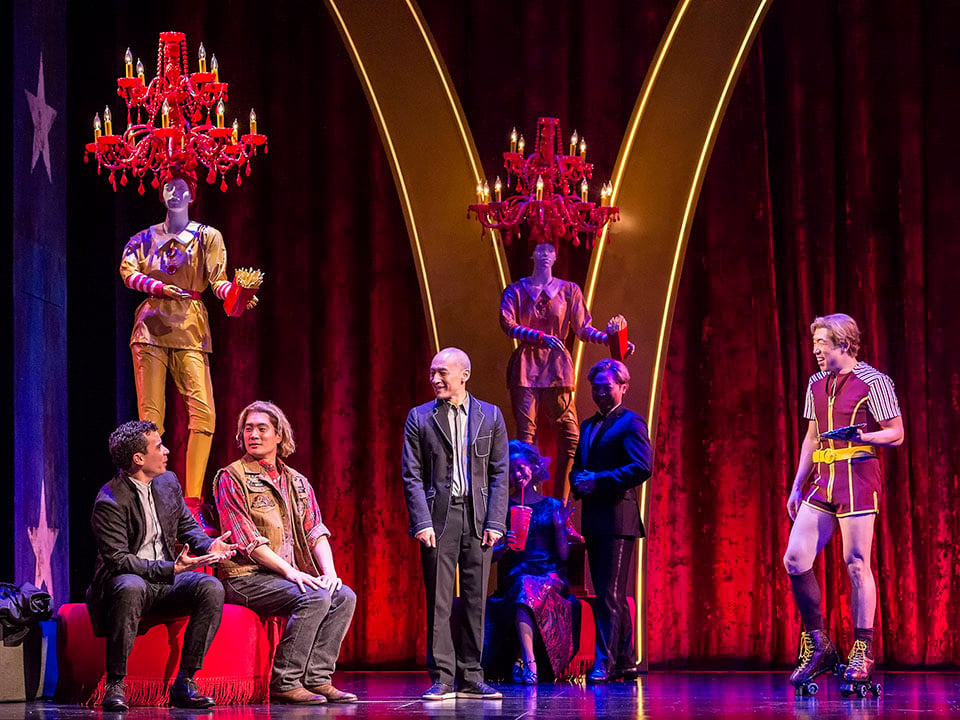David Henry Hwang’s latest musical entry begins not with lavish costumes and an extravagant opening number, but the staple of any a straight play: a two-handed conversation. His fictional self, played by Francis Jue, negotiates with Chinese film executive, Xue Xing (Conrad Ricamora of “How to Get Away with Murder” fame), over the screenplay of an upcoming TV show set in Shanghai. The conversation devolves into an argument over how China should be presented in the production — Xing wants the truth, demanding the lover-protagonists act honorably as the Chinese do, whereas Hwang insists that only impulse will sell. All their talk points toward what they identify as the “delivery system” — essentially the rhetoric we use to present ourselves as opposed to who we actually are.
We never see the resolution to their debate because this is where the show turns over its head. After an unnamed attacker stabs Hwang in the neck — a plot point taken directly from Hwang’s real near-death experience in 2015 — a musical fantasy overtakes the stage, complete with a sweeping score by Jeanine Tesori (“Fun Home”) and choreography by Sam Pinkleton (“Natasha, Pierre, and the Great Comet of 1812”). Here, the year is once again 2016 and Hillary Clinton, played with just the right amount of neurotic by Alyse Alan Louis, nears the end of a struggling campaign against He-Who-Must-Not-Be-Named. In comes a bewildered Xue Xing with Hwang on the night of her last event in a flamboyantly decorated, post-modern-kitsch McDonald’s (credited to prolific Broadway set designer David Zinn). As in any East meets West musical, Xing and Clinton fall in love over a song dedicated to their cultural differences, though this time it’s a quirky number playing on the four tones of the spoken Chinese language.
All the fun and games gets cut short on election night, when, lo and behold, Hillary is not elected. The new administration declares war on China, and Xing rushes to the White House, the Neoclassical columns replaced with giant cans of Budweiser, to stop the madness. And in one inspired number, the administration relinquishes their guns at Xing’s request and the world is supposedly saved.
But a scene from reality set a hundred years in the future reveals that the events in the musical stray far from historical honesty. Despite “Soft Power” branding itself as a show about American democracy, it really is a musical about musicals. One of the greatest joys is watching the interplay between Hwang and Tesori’s musical numbers and Zinn’s audacious design, reminding us of why we fall in love in musicals, not in spite of but because they bend the truth. I’m recalling how “Hamilton” reinvigorated a new generation of interest in Broadway, even when it took considerable liberties with the history. Through this lens, the production’s triumphant conclusion, “Democracy,” is less a celebration of the U.S. political system than a criticism of feel-good resolutions that lead to hand-waving activism.
Unconventional twists like these make “Soft Power” a risky creative pursuit, and the risks do not come without consequences. While what Hwang tries to do with the book is undoubtedly inventive and, dare I say, unprecedented, the message — which is never quite clear, despite Hwang’s often iconically insistent works on cultural identity — doesn’t quite emerge by the closing number. Ironically, it’s because the musical element of the show is having too much fun. Although the cast, led by a compelling Ricamora, plays their caricatures with commendable restraint, the show runs into the pitfall it aims to critique. By the end of the show, you’re more likely to leap to your feet than think critically about what you just witnessed. The “delivery system” has worked a tad too well.
As Hwang and his team push “Soft Power” toward Broadway, they need to give the show room to breathe, turning its intentions less on the musical form and more on itself. Fortunately, they’ve already got a strong foundation to work off of. I’m excited to see where Hwang goes with his book, which already lands all the right comedic notes. If you get the chance, I wholeheartedly recommend seeing this show at the Curran in San Francisco before it closes on July 8. This is a piece of theater that will challenge what you know, but rather than being cerebral, it chooses to be fun. This might be the breath of fresh air Broadway needs right now, though whether it is ready, time will tell.
Contact Starr Jiang at yuchenj ‘at’ stanford.edu.
